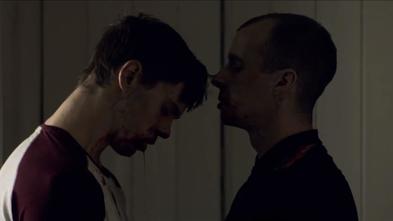 Pardon the pun, but zombies have been done to death. Between The Walking Dead, Fear the Walking Dead, and whatever iterations of Dead are forthcoming, plus the multitude of other direct to VOD zombie flicks, the sub-genre has taken on the form of the titular creature it propagates; an overwhelming horde of flesh-eating fiends oversaturating our TVs. That’s why it’s so damn refreshing to see The Cured take a more unique approach to the undead… …Written/directed by David Freyne, The Cured stars Sam Keeley as Senan, a man who has been cured of a “zombie virus” known as the Maze Virus. In a post-apocalyptic world where the disease has been mostly wiped out aside from about 25% of the infected, Senan is forced to live with the only person who will take him in, his sister in law, Abbie (Ellen Page). It’s not all sunshine and happy endings though, as not only does the rest of the world hate Senan and his brethren for what they have done, but he and the rest of the cured can remember every…single…kill. Every moment, every scream, every splash of blood on their faces, they remember. With the rest of the world despising them and treating them like animals, Senan’s fellow cured friend, Conor (Tom Vaughan-Lawlor) begins to formulate a plan to take back the world. From the very beginning, The Cured is a fascinating thesis on what could happen AFTER a cure is found in all of those countless zombie films we’ve seen. So many of those movies have characters desperately seeking a cure, that we as the audience never really stop to wonder, what would happen if they found it? The Cured explores this idea wonderfully, presenting a world in chaos. There are factions of those who believe the cured should be welcomed back to society, and a majority who protest against it. The film is (likely) unintentionally timely, regarding the current state America and other nations in the world find themselves in, embattled in a war between sides over immigration issues. While The Cured is dealing with a much different discussion, the central issue is the same: Fear. The people fear the cured so much, that they are never even given a chance to assimilate into the world and in many ways are used as scapegoats and propaganda tools. Sound familiar? Imagine that for a moment. You’ve just been cured of the zombie virus, and you’re left with the guilt of remembering every person you killed, some of them probably people you cared about. And then you’re cured, and you come home, only to be treated with absolute discontent with everyone around you, forced to visit soldiers for “checkups”, men who beat you and spit on you and say you are lesser than them. All of this makes Senan instantly relatable, and Sam Keeley portrays his character with the quiet relatability of a sad, lost person who doesn’t know where they fit in in the world. The effect is devastating for the viewer. It’s painful to watch Senan deal with the guilt of what he has done, plagued by recurring visions of his deeds over and over again, all the while trying to gain the forgiveness/trust of his sister in law, Abbie, equally well acted by Page as someone trying as hard as she can to look at Senan as a person and not the monster he was, despite the fear of him being around her son, Luke (Peter Campion). This is The Cured’s greatest strength, in that it is unlike any zombie film I have seen with the way it asks the audience to relate to the zombies. Even Conor, the “villain” of the piece, is understandable in his reasoning for wanting to rise up against the humans. Why should he remain a prisoner of the world, when he could rule it? The Cured repeatedly assaults its audience with these sorts of pondering questions. It is not a film for anyone just wanting to sit back and watch a B-zombie movie. This is a film that forces its audience to shamble in the shoes of the monster and see, hear, and think the way he/she does. Freyne gifts his audience with an original premise, but that doesn’t mean most of the standard zombie tropes can’t be found, though some come with a slight twist. You see, even though these people are cured, they are all still connected by some sort of telepathic sense that allows them to communicate with each other intuitively. This allows for some pretty unnerving moments once Abbie, a reporter, begins investigating where Senan is going, and what Conor is planning. It’s chilling to see what appears as normal humans following silent orders, reminding me of films like Invasion of the Body Snatchers. It’s also pretty eerie when you stop to think that this is often how terrorist groups are formed. Conor is not inherently (as far as we know) an evil person. But we watch as he is shamed, abused, and told that this isn’t his world anymore, so it’s no wonder he feels he must act aggressively and decides that his cured “family” takes precedent over the lives of any human being, man, woman, or child, doesn’t matter. Though the emotional philosophy is consistently engaging, it is also a tad detrimental to the film, as it becomes the primary focus over the inherent tension and horror of the premise. That isn’t to say that there isn’t any horror in the film, there are chills and thrills spread throughout, all leading to an explosive finale, but creating suspense does not seem to be Freyne’s strong suit. One successful moment in particular stands out like an infected thumb, when Conor asks Abbie if she thinks the cured should be forgiven. The silence between question and answer is long and deeply uncomfortable, but scenes like this don’t occur nearly often enough in quite the same manner. When the horror comes, it is primal and intense, but all too brief. So even though I found myself engaged in the emotional drama of The Cured, I was merely wandering through the terror like the undead, unaware of any actual danger around the corner. Little suspense in a zombie film can be fatal, and in this case, it’s the bullet to the head of The Cured. (SPOILERS) Perhaps most unforgiving in The Cured is the (obvious) revelation that Senan was the one who murdered Abbie’s husband, his brother. I’d normally be okay with this, even if it is a bit clichéd, but the problem is we’re supposed to be rooting for Senan, yet The Cured heavily implies that as a zombie, Senan was still in control. More driven to kill and manipulated by Conor, the zombie “leader”, but in control none the less. It’s this realization that, if you ask me, makes Senan’s actions unforgivable. This hinders the response to the powerful moment when Senan admits his deeds to Abbie. Both actors are strong in their rage and gut-wrenching sadness, but there’s a slight disconnection in knowing that Senan doesn’t deserve as much sympathy here. Senan does manage to earn some sort of redemption, and the message is clear by the end that people can overcome the horrors of their past when given the chance and support that they need. But I can’t help but feel like the impact of that is lessened knowing that Senan makes the choice to kill his brother. (END SPOILERS) By the end of The Cured, you’ll find yourself asking, does Senan deserve to be forgiven? It’s just part of the intelligence of The Cured, a thinking-fan’s zombie film in a sub-genre so heavily populated by mouth-breathing brain munchers. If the originality doesn’t grab you, the emotions most certainly will, making this a unique zombie experience that deserves to be seen and pondered by any and all fans of the walking undead. Horror fans expecting lots of gore and zombie action won’t get their fill here, but they might just find themselves wondering how the Tar Man in Return of the Living Dead would feel if he was cured and remembered party pooping all over those kid’s good time. By Matt Konopka
0 Comments
Leave a Reply. |
Archives
March 2023
|


 RSS Feed
RSS Feed